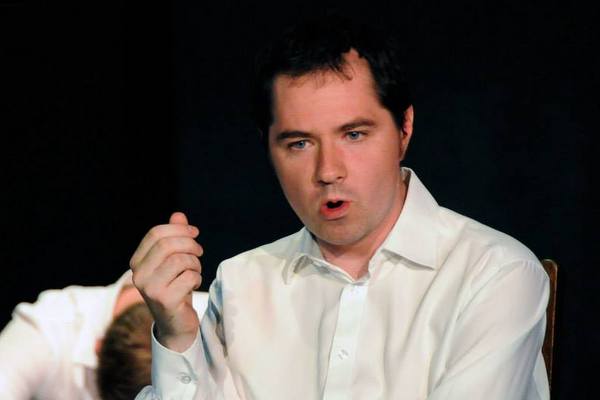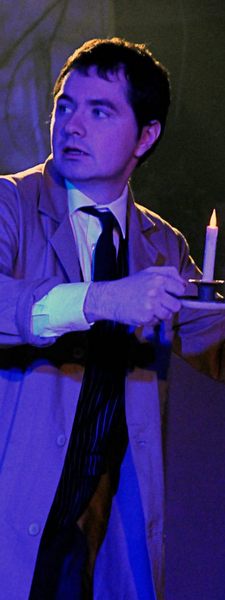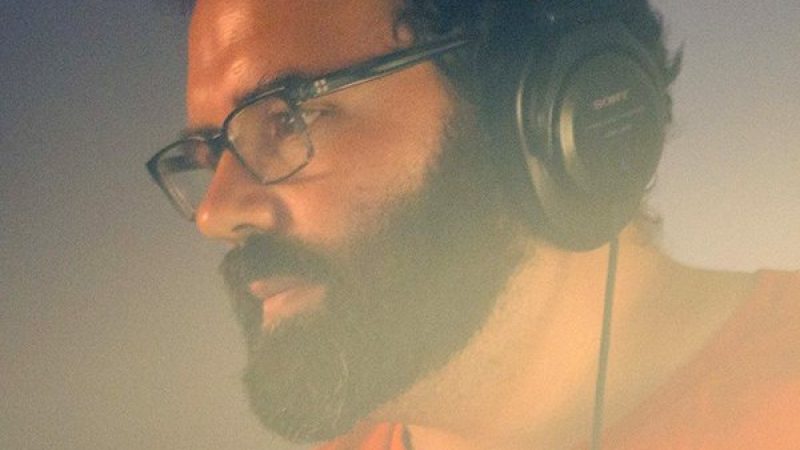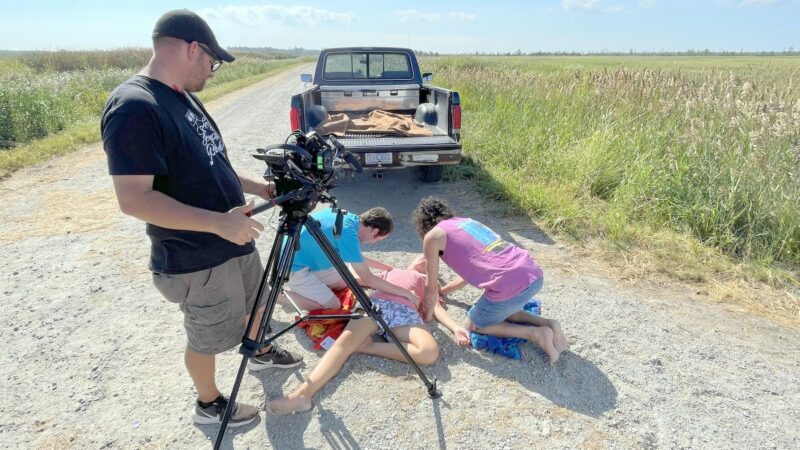
David Cole wanted to be an actor before he even knew what acting really was. David was always a very imaginative child, and loved to play make-believe, and was always more comfortable playing a character than being himself. David Cole had a very inspirational teacher who encouraged him to work on building up his confidence. She called in a favour to get David into a summer Youth Theatre course in his native Bristol, England, which was the start of a long association of theatre acting, and he owes her a big debt to this day.
Just a few of the Bath Actors appearing in @tv_arts #ShakespeareOnScreen shoot. Lucky us! @TheatreBath @CreativeBath @cahootify @WeLoveBath pic.twitter.com/7DCW1KfQwz
— TV Insight (@tv_arts) November 8, 2016
Did you study acting
I took part in a few Youth Theatre plays/training workshops, before embarking on a year-long course at Bristol Acting Academy, which is run out of Bristol’s Old Vic Theatre School (whose alumni include Sir Patrick Stewart, Daniel Day Lewis and Gene Wilder) by its Senior Voice and Dialect Tutor Gary Owston and now-former Head of Movement Gail Gordon. I feel I’ve always had a good instinct for acting, but it was wonderful to be able to hone it in such a way under the guidance of such great practitioners, and I learned a great deal about script analysis, discerning a writer’s intent, and building a character.
What acting technique do you use
I’m quite instinctively naturalistic, and I’m invested in making an emotional connection with a character, and giving them an internal life. I find that Stanislavski’s techniques of psychological realism and sense memory are helpful tools. I find it helpful to sit down with a script and map out the ‘journey’ of a character within a scene, using the technique of “Unit-ing and Actioning”; breaking the text into bite-size chunks by identifying moments in the scene where there’s a change in direction – this can be a change of status between two characters or perhaps a change in intent – and labelling each section between these changes as a “Unit” (sometimes also called a “Bit” or “Beat” – I believe there’s a common metaphor of this being akin to looking at the script like a musical score). Then, the character’s objective towards another character within that beat is determined and given an identifying action in the form of a transitive verb; “I [….] you.”
Filming “Suspension,” my written segment of the feature film “One.” I’m standing in here for a shot set-up. pic.twitter.com/d5tC17BQNY
— David Cole (@DavidCole86) April 21, 2013
What wrong impressions do actors hold about acting
That it’s all glamour and glitz. There’s a lot of rejection and it can be very draining. I’ve heard it said that the industry usually doesn’t so much set out to be cruel, but can often be cruel in its indifference, and it’s true. A lot of time and money rides on getting casting exactly right. The situation on the first Back to the Future movie where Eric Stoltz was replaced by Michael J. Fox two months into shooting, at several thousand dollars’ expense, happens once in a blue moon. By and large, if a production miscasts a lead role and it doesn’t become apparent until a significant way into the process, they’re up the proverbial creek without a paddle. Casting Directors therefore often literally can’t afford to take a huge leap of faith on an actor; you may be perfect for it, but if they’re not absolutely certain you’re right for it, they’re not going to cast you. A lot of the time, too, it doesn’t matter how good you are in an audition if you don’t look exactly right, are too tall/short/fat/thin/blond etc. I’d recommend to anyone to look up Bryan Cranston’s Advice to Aspiring Actors on Youtube; basically, just go into an audition, do what you do and leave. Then forget about it. Often, that’s all you can do.
Do you take courses to improve your craft
I have. I have recently taken workshops with Drama Direct and Screen Direct, two companies led by actor Mark McGann that specialise in stage and screen training, respectively, and have taken part in other various screen acting workshops in a bid to broaden my knowledge of screen techniques.
What acting books do you read
I’m particularly fond of ‘The Complete Stanislavski Toolkit’ by Bella Merlin, which collates Stanislavski’s material into one volume. Also, ‘About Acting’ by Peter Barkworth and ‘Respect For Acting’ by Uta Hagen.
Meeting @IanMcKellen a couple of years ago, after Kelvin Players’ production of “The Sea”. pic.twitter.com/JSdwziIc
— David Cole (@DavidCole86) January 16, 2013
How do you keep fit as an actor
Physically, not as well as I should, to be honest! I do walk a lot, and I’m lucky enough to have a part-time day job that involves being in character as a tour guide, which is fairly mentally stimulating and keeps me on my toes. I was taught a series of physical and vocal warm-up exercises, which I do now and again to keep myself fresh.
How do yo prepare for a role
While I think it’s essential to have a good enough idea of my character’s role in the bigger picture to serve the text accordingly, I usually tend to start from the inside out, by looking at the character’s individual story – what’s his background? Where does he come from? – before looking at how he fits into the specific story the writer has laid out. If I were doing something a bit more Brechtian or plot-driven, however, perhaps the opposite approach may be called for. I prefer to learn lines by osmosis through doing them in rehearsals if I can – the less sit-down line-learning I can get away with, the better! When necessary, though (and it usually is), there are word- and thought-association techniques that I employ to connect one line to the next.
How do you create a character in a script into a person
While I think it’s essential to have a good enough idea of my character’s role in the bigger picture to serve the text accordingly, I usually tend to start from the inside out, by looking at the character’s individual story – what’s his background? Where does he come from? – before looking at how he fits into the specific story the writer has laid out. If I were doing something a bit more Brechtian or plot-driven, however, perhaps the opposite approach may be called for. I prefer to learn lines by osmosis through doing them in rehearsals if I can – the less sit-down line-learning I can get away with, the better! When necessary, though (and it usually is), there are word- and thought-association techniques that I employ to connect one line to the next.
How do you stay fresh on set
My experience is primarily on the stage, and with the on-camera work I have done, I’ve tended to play characters fairly close to myself. There can be a lot of waiting around though, between takes, and it can be difficult to stay in-character, but I’ve not yet been put through the challenge of having to take on a hugely difficult, emotionally heavy role on-screen. From my experience so far, I can tell you that I find it helps to take a few minutes before each take just to centre and remember where you are in the scene, as these things are often shot out of scene order, according to filming logistics. On stage, it’s a continuous experience, and therefore easier to build up a head of steam with the character, and to take him on an emotional arc in a linear fashion.

David Cole as ‘Jack’ in ‘JACK’ a then-new play of the same name by James Bonse
Describe a memorable character you played
In 2012, I played a character called Jack in a then-new play of the same name by James Bonser. Without giving too much away in case the play is re-staged in the near-future, it provided an opportunity to show a range of complex emotions, and to play a more sinister and villainous role, which is always a lot of fun, and something I’d like to do more!
Explain one creative choice you took on set
I have multi-rolled a few times, and I’ve found that being in that situation forces you to make creative choices that you wouldn’t make otherwise, as each character has to be distinguished from the other. I once played both Camillo and the Clown in The Winter’s Tale, which was an interesting challenge, and I played the Clown in quite a broadly comedic, somewhat camp way, which might not have occurred to me had I not also been playing the more restrained Camillo. The challenge is to make that work in within the framework of the character and his role within the text, in a way that feels like a natural, organic choice and not artificial. I hope I pulled it off!
 What do you want most from a director
What do you want most from a director
Someone with a clear vision of what they want, who can be a guiding hand while giving an actor the freedom to explore creative choices and to not feel constrained, which is not necessarily an easy balance.
What actors do you long to work with
I’m a fan of actors with a chameleonic ability to transform into a role, like Johnny Depp or Toni Collette. If I had to pick one though, it would be Sir Ian McKellen.
Why
I’ve had the pleasure of meeting him, before I trained. I was in a non-professional production of ‘The Sea’ by Edward Bond, with a theatre group called the Kelvin Players. Kelvin is a member of a nationwide association of amateur/community theatre groups called the Little Theatre Guild, of which Sir Ian is patron and president. He occasionally visits member groups and watches their latest production, and we got to meet him after the show. He was complimentary about my performance (more so than I was on that occasion, but I’m my own worst critic), and wished me luck in my career. I’d always been a great admirer of his work, but that experience made me a great fan of him as a person, and I would love to work with him in a professional capacity.
What advice would you give to actors
I guess to be proactive, persevere, and accept that most of the knock-backs you’ll get won’t be too personal; so many factors involved in getting a role are out of your control.
Briefly write about your career
I have been active primarily on stage, working with companies Thrice Three Muses and Brass Works Theatre. I recently had the opportunity to support the English National Ballet in their tour of Romeo & Juliet, which was a great experience. I have enjoyed doing Shakespeare and hope to do more; in fact, I’ve done three separate productions of Romeo & Juliet, each one a larger-scale production but a decreasing role, but that’s showbiz!
INTERVIEWS
In Conversation with Michael Oblowitz Director of Confidential Informant
Confidential Informant stars Mel Gibson, Dominic Purcell, and Kate Bosworth






